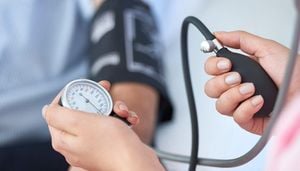While the diagnosis of prostate cancer can feel like a heavy burden, recent data reveals significant findings about the state of prostate health among men, especially in the UK. The rise in diagnoses, particularly during Men's Health Awareness Month, highlights the importance of increased awareness and testing options available for this common yet often overlooked condition.
Recent statistics have painted a concerning picture for prostate health across the UK, with notable increases in diagnoses reported for 2022. Specifically, figures indicate a staggering 29 percent rise—totaling 1,731 men diagnosed with prostate cancer within the NHS Buckinghamshire, Oxfordshire, and Berkshire West Integrated Care Board. Overall, England saw about 26 percent growth, with nearly 55,000 new cases recorded. This upward trend demonstrates the need for proactive health screenings, especially as experts caution about men being diagnosed at later stages, which diminishes treatment effectiveness.
Prostate Cancer UK, the leading charity advocating for those affected by this disease, had long warned about the dire consequences of late diagnosis. Amy Rylance, the charity’s assistant director of health improvement, explained how testing rates plummeted during the COVID-19 pandemic. "By early 2022, there were over 14,000 men missing a prostate cancer diagnosis," she stated. This alarming number spurred the launch of their campaign to seek out these 'missing men' through creative initiatives, such as developing online risk assessment tools to help men determine their individual risk for prostate cancer.
The focal point now lies on how effective these outreach initiatives are, as Rylance indicated, "we saw record-breaking numbers of referrals with suspected cancer, and this data confirms the effectiveness of our campaign." What’s particularly notable is the demographic breakdown of those diagnosed; men between the ages of 70 and 79 accounted for the largest percentage of diagnoses—40 percent of all cases. The figures are even close within the applicable region, where 39 percent of those diagnosed also fell within this age group.
Comparative regional disparities exist throughout England, too. For example, north central London reported rates of up to 275 cases per 100,000 people, compared to just 177 per 100,000 diagnosed across Lancashire and South Cumbria. For those living across Buckinghamshire, Oxfordshire and Berkshire, the rates came out to 220 per 100,000—a stark reminder of the inconsistencies present within cancer diagnoses nationwide and how some areas lag behind others.
Meanwhile, clinical experts were quick to point out the need for men, particularly those belonging to high-risk categories (like Black men or those with family histories of early age cancers), to actively seek screenings and health consultations. Claire Taylor, chief nursing officer at Macmillan Cancer Support, emphasized the significance of early detection. "Early diagnoses save lives," she stated, reinforcing the urgency of regular checks.
But it’s not just about statistics and numbers. It’s about creating tangible change. Prostate Cancer UK calls on the government to revise NHS guidelines, allowing GPs to engage with men at higher risks about their health options. This change could encourage many more men to participate actively in their health care and, potentially, save thousands of lives every year.
To support individuals eager to learn more about their risk levels, Prostate Cancer UK has created online tools. For those concerned about prostate cancer, simple measures like visiting www.prostatecanceruk.org/risk-checker can illuminate personal risk levels, informing decisions about health consultations and tests. Macmillan Cancer Support also provides relevant resources at www.macmillan.org.uk to help guide patients through their challenges.
Pushing beyond diagnosis rates, the narrative of prostate cancer care is rapidly transforming thanks to advances in technology. Innovations are impacting everything from testing methods to treatment protocols, ensuring folks not only get diagnosed but can also receive swift and effective care without the burdensome side effects historically associated with prostate cancer therapies.
For Kiwis across the pond, numbers indicate their plight is similar, with about 4,000 men diagnosed with prostate cancer each year. Here, healthcare advances have contributed to not just increased detection, but also reductions in mortality rates connected to the disease. Thanks to modernized treatment methods, patients report improved quality of life, often experiencing quicker treatments and manageable side effects.
The combination of early detection, access to care, and improving treatment options paints a hopeful picture for men diagnosed with prostate cancer. The challenge lies not solely with those diagnosed but also with healthcare systems, policymakers, and advocates ensuring health awareness reaches those who need it most. Gathering momentum around events like Men's Health Awareness Month reminds us all to notice the often-neglected health needs of men, lifting the veil of silence surrounding conditions like prostate cancer.
What will it take to secure the support, awareness, and medical attention these men require? Perhaps more than mere statistics, the narrative lives and breathes through the stories of real men and their battles with prostate cancer. From too many missed diagnoses to advancements driving down mortality rates, the movement for awareness is just getting started.
This Men’s Health Awareness Month, as the statistics continue to roll out, it's more important than ever for men to understand their risks and take proactive steps to safeguard their health. Prostate cancer may often command the spotlight, but it's reminders such as these—it’s all about early detection, education, and the removal of the stigma around seeking medical help.
Every man deserves to know he can take charge of his health and is encouraged to get checked. Waiting can be dangerous, and with information at one’s fingertips, there is no longer any excuse to delay those all-important screenings. Through awareness and action, the battle against prostate cancer can be won.



